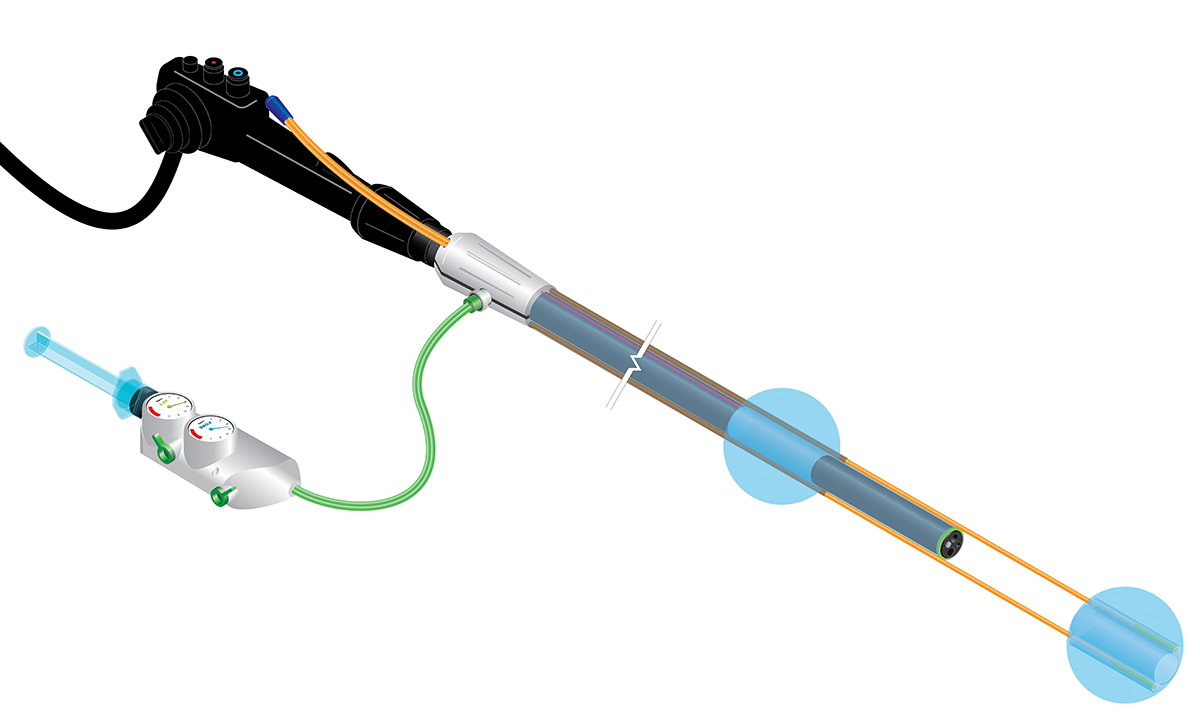Startup to take Weill Cornell endoscopic tools to market
By Anne Machalinski and Alyssa Sunkin-Strube


The Minimally Invasive New Technologies Program (MINT) at Weill Cornell Medical College and NewYork-Presbyterian Hospital has teamed with entrepreneurs and investors to establish Lumendi Ltd., a new start-up company dedicated to producing next-generation endoscopic tools that make complex gastrointestinal surgeries safer and less expensive while also improving patient outcomes.
The agreement between Weill Cornell and Lumendi will advance the development of the Endolumenal Surgical Platform (ESP), a new disposable device that fits over a standard endoscope like a sleeve and provides increased stability, control and visualization within the intestine. These features allow clinicians to remove large polyps and eventually to treat strictures, fistulas and many types of inflammatory bowel disease without necessitating open or laparoscopic surgery.
The ESP is designed to transform the way gastrointestinal surgeries are performed by enabling clinicians to perform complex procedures endolumenally – from entirely within the intestine – resulting in less-invasive surgeries, quicker patient recovery and reduced healthcare costs.
Lumendi will seek to transform the ESP prototype developed at MINT into a commercial product and seek clearance from the U.S. Food and Drug Administration. In collaboration with Lumendi, the MINT team plans to develop a series of new products designed to enhance the ESP.
“We are defining a new era of digestive surgery, and we believe that the ESP will pave the way,” said Dr. Jeffrey Milsom, chief of colon and rectal surgery at Weill Cornell Medical College and NewYork-Presbyterian/Weill Cornell Medical Center and MINT co-director, who holds an equity interest in Lumendi and serves as a paid adviser to the company.
The ESP design features two balloons that create a therapeutic zone inside the intestine, allowing clinicians to stretch out the intestinal wall and straighten folds and bends to stabilize and visualize the colon. The design also permits stabilizing the endoscope tip at the site of the disease, allowing clinicians to target their movements precisely.
“Current endoscopes don’t offer the same level of stability that ESP does,” said Milsom, who is executive director of the Center for Advanced Digestive Care at Weill Cornell and NewYork-Presbyterian/Weill Cornell Medical Center, and the Jerome J. DeCosse M.D. Distinguished Professor of Surgery at Weill Cornell Medical College. “With this device, you can better control and manipulate the surgical environment inside the intestine.”
As part of the agreement, MINT plans to develop new products to enhance the ESP platform and increase the number of procedures that can be performed endolumenally. These tools include flexible surgical instruments that will enable precise complex surgical procedures to be conducted within the intestinal channel.
“Creating Lumendi has opened up many new possibilities for advancing gastrointestinal surgeries,” said Dr. Peter Johann, chairman and CEO of Lumendi. “This innovative relationship has the potential to transform digestive care for patients around the world.”
Lumendi holds an exclusive worldwide license from Weill Cornell on the ESP platform and related products. Formed in December 2014, Lumendi is collaborating with MINT to further development these devices. For more information, visit www.lumendi.com and www.mint.weill.cornell.edu.
Anne Machalinski is a freelance writer; Alyssa Sunkin-Strube is an editor at Weill Cornell Medical College.
Media Contact
Get Cornell news delivered right to your inbox.
Subscribe